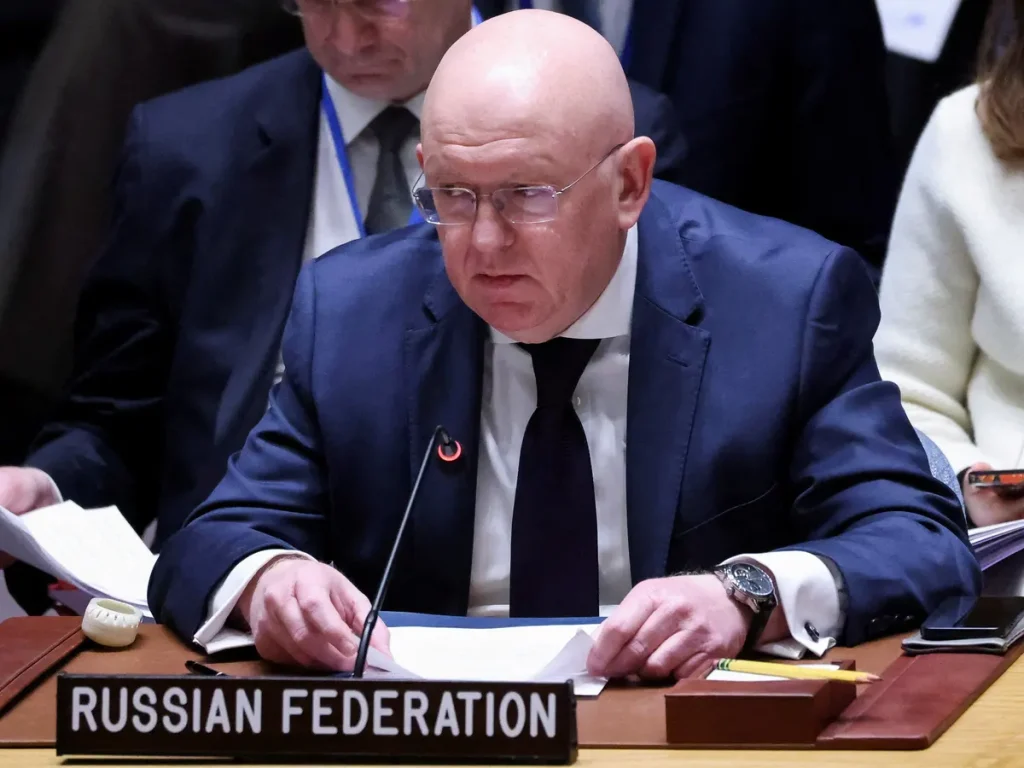A veto exercised by Russia has effectively halted the monitoring of U.N. sanctions against North Korea concerning its nuclear programme. This move has triggered accusations from Western nations, alleging that Moscow aims to evade scrutiny while reportedly breaching sanctions to procure weapons from Pyongyang for its involvement in the conflict in Ukraine.
The decision by Russia to block U.N. monitoring illustrates the deepening rift between Moscow and the U.S. along with its Western allies, since the onset of the conflict in Ukraine. This growing animosity has hindered consensus even on issues where longstanding agreement once prevailed.
The veto transpired during a vote on a U.N. Security Council resolution intended to extend the mandate of a panel of experts overseeing sanctions on North Korea for another year. However, as a result of Russia’s opposition, the panel’s operations will cease upon the expiration of its current mandate at the end of April.

The vote, with 13 members in favour, Russia against, and China abstaining, does not impact the existing sanctions against North Korea, which remain in effect.
Russia’s unprecedented veto disrupts the work of the panel of experts, which had received annual renewals from the U.N. Security Council for the past 14 years, reflecting global unity against North Korea’s advancing nuclear capabilities.
In addressing the Security Council before the vote, Russia’s U.N. Ambassador Vassily Nebenzia accused Western nations of attempting to suffocate North Korea with sanctions, asserting that the effectiveness of sanctions in preventing nuclear proliferation in the country has diminished over time.
Nebenzia criticised the panel of experts for allegedly aligning with Western perspectives, describing their analysis as biassed and disconnected from reality.
However, U.S. Deputy Ambassador Robert Wood countered, emphasising the crucial role of the panel’s independent investigations. Wood accused Russia of seeking to silence the panel due to its recent reports exposing Russian violations of U.N. Security Council resolutions.
Wood warned that Russia’s veto could embolden North Korea to further undermine global security through the development of long-range ballistic missiles and the evasion of sanctions.
John Kirby, a spokesperson for the White House’s national security, condemned Russia’s veto, labelling it a reckless action undermining sanctions against North Korea. He cautioned against the deepening cooperation between North Korea and Russia, particularly concerning weapons procurement amid Russia’s involvement in the conflict in Ukraine.
Barbara Woodward, Britain’s U.N. Ambassador, criticised Russia’s veto as a means to evade sanctions and engage in arms deals with North Korea, which contravene U.N. resolutions. She highlighted Russia’s alleged transfer of ballistic missiles to be used in the ongoing conflict in Ukraine.
France’s U.N. Ambassador Nicolas de Riviere echoed similar sentiments, accusing Russia of supporting North Korea’s aggression against Ukraine through military material exchanges in violation of U.N. resolutions.
In response, Russia’s deputy U.N. ambassador, Dmitry Polyansky, dismissed these accusations as unfounded insinuations, reaffirming Russia’s decision not to support the extension of the panel of experts.
The Security Council initially imposed sanctions on North Korea following its first nuclear test in 2006, progressively tightening them over the years. The most recent sanctions resolution was adopted in December 2017. However, efforts to impose additional sanctions were vetoed by China and Russia in May 2022.
The panel of experts, whose mandate was renewed annually for 14 years, had been investigating various violations, including cyberattacks and illicit procurement activities, contributing to North Korea’s weapons development despite sanctions.


